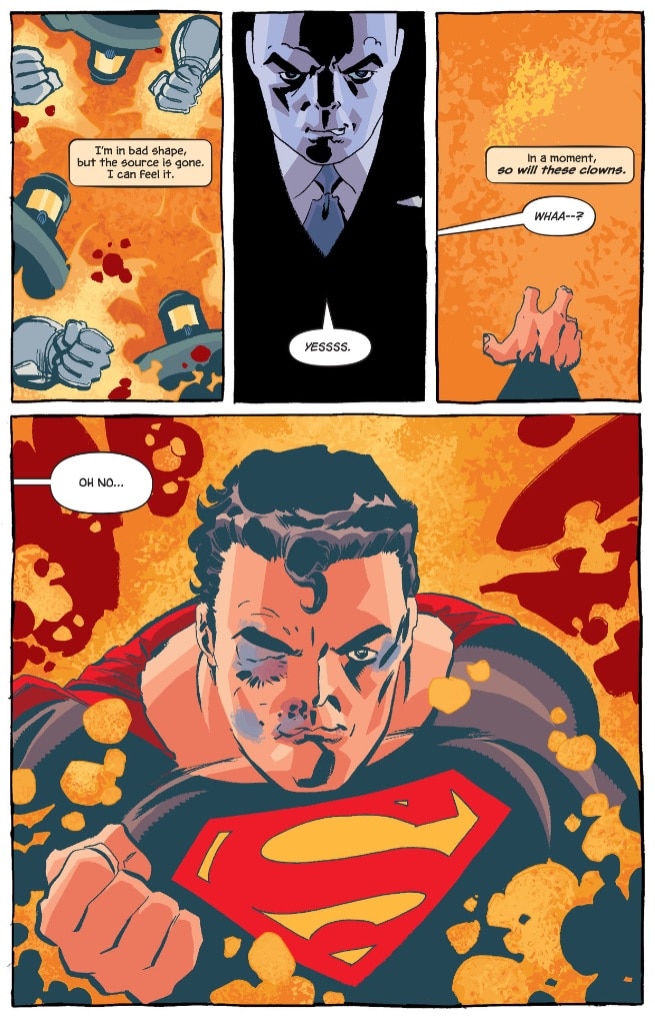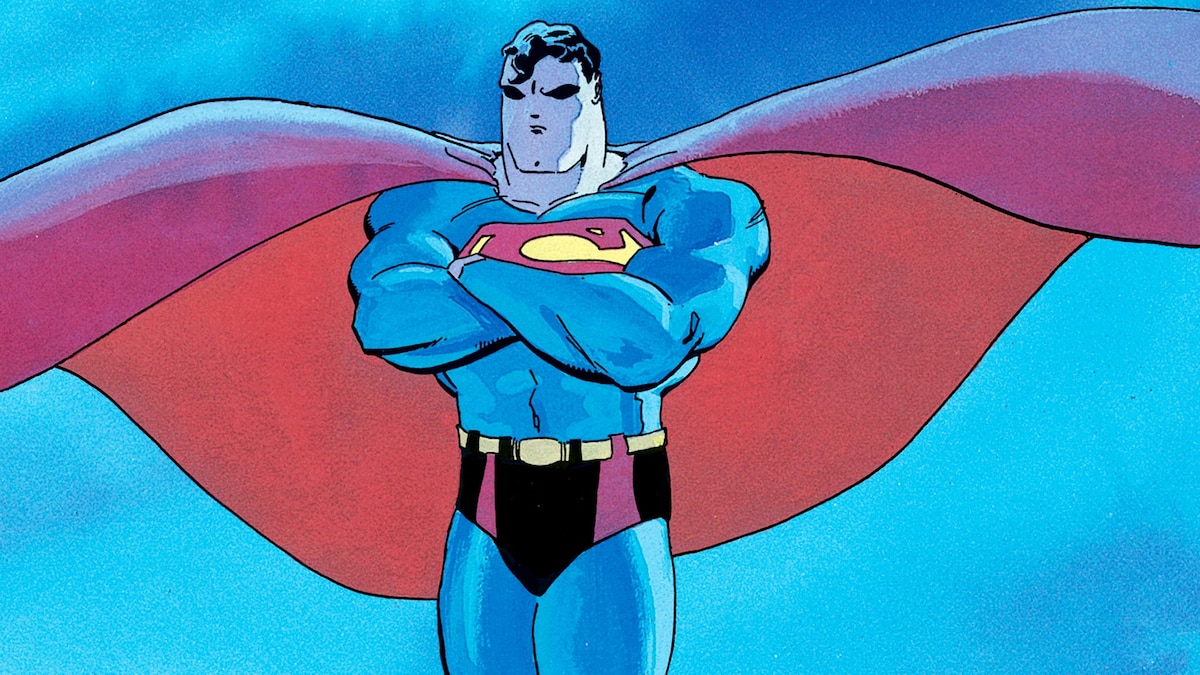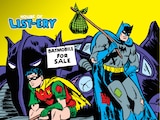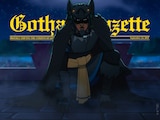We’re not sure who it was that first compared Tim Sale to Norman Rockwell, the 20th century painter who captured the soul of America at its most idyllic. If the topic of Tim Sale has come up at your local comic store, or while poring through a longbox collection of treasured Batman or Superman issues in his memory, it’s probably not the first time you’ve heard it. And yet, to look at their art side-by-side, it’s not an aesthetically obvious analogy. Rockwell’s attention to light and shadow, photorealistic detail, and cherubic figures seems to share little in common with the daring, dramatic line work of Sale. But it may be that evocative power that invites the comparison.
While Sale and Rockwell took different technical approaches to how they achieved it, both artists had the same mission: to express through art that inexpressible sense of wonder and possibility associated with Americana. The love of family; the freedom of the press; the empowerment of women; the safety of our wayward children—these were all ideas expressed through Rockwell’s favorite subjects. Whether those values truly represent America, or merely what we hope America aspires to, is a thought experiment invited by the art itself. But those ideals of a caring, wholesome America are exactly those embodied by our nation’s greatest icon: Superman.

Like Rockwell’s America, Superman doesn’t necessarily reflect America as it is, but America as it can be. For most of his existence, Superman’s name was synonymous with “The American Way” because of our beliefs in what America should represent: equality, honesty and empathy for all. And if that’s the end goal of Rockwell’s art and Superman’s America, no one has captured what it means to live on the world the Man of Steel fell in love with like Tim Sale in Superman For All Seasons.
Told through the perspective of the closest people to Superman—Pa Kent, Lois Lane, Lex Luthor, Lana Lang—Superman For All Seasons tells the story of a young hero facing disillusionment with his quest to help humanity on its journey to greater potential, only to rediscover his love outweighs his fear when he returns to America’s heartland. Superman For All Seasons is an artist-first book, selling America’s beauty through its simple but expressive sweeping landscapes and the expressions of its characters’ plain but emotive faces, always valuing the conveyance of feeling above sheer realism. What’s Rockwellian about Tim Sale’s Superman For All Seasons isn’t his style, but in what he achieves: art which reminds you of everything you were ever told about the way America was, and the way America should be.

Of course, Rockwell’s America was an imperfect, simplified picture which didn’t often account for the experiences of marginalized American communities and could be fairly accused of whitewashing both the history and reality of American life. Like many artists, Rockwell’s perspective was limited and could have benefited from a wider point of view.
Sale, too, didn't directly address the faults of this whitewashed vision of America. That came later. But before Sale earned a reputation as DC's Rockwell, he was a master of fear. While his Superman art is characterized by its hope and optimism, the distorted, sinister shapes he uses to illustrate Gotham City and its denizens tell a different story. Just as well as he could conjure the American Dream, Tim Sale was even more notorious for his ability to conjure a nightmare.
Beginning with the annual “Haunted Knight” specials in the Legends of the Dark Knight series, Tim Sale was quickly inseparable from Halloween in Gotham City, which is how we got to Batman: The Long Halloween, a warped thirteen-month merry-go-round through Gotham’s greatest villains and a complicated organized mob mystery which still haunts Batman fans to this day. We felt the heat radiate off Johnny Vitti’s wedding as flames erupted around Selina Kyle and Bruce’s chemistry. We lost ourselves in the jagged smile of the Joker which seemed to eclipse his entire face. We even felt the plaintive loneliness, perhaps for the first time, of the sewer-dwelling Solomon Grundy. It’s no wonder that Sale kept up a relationship with The Long Halloween until just months before his passing, spawning sequels and spin-offs spanning decades in his uniquely stylized Gotham City.

To my mind, though, there’s only one comic in DC history which truly captures Tim Sale’s range. The hopeful heights of Superman and the grim depths of Gotham, all in one story—wone which re-examines Clark as a symbol of America by presenting him with his identity as an immigrant.
It’s not as famous as Superman For All Seasons or The Long Halloween. And how could it be? Both of those stories are near the top of any recommendation list for readers interested in DC’s two most enduring icons. But once you’re through those entry doors, then look no further for the full Sale experience than Superman Confidential. The first arc of this series pairs Tim Sale with his close friend, the brilliant and deeply missed Darwyn Cooke, to apply the nightmares he put Batman through to Superman’s sense of alienness and lost heritage. How does Superman cope with the fears and insecurities which defined the illustrated horror of “Haunted Knight?” Can Superman, Sale’s artistic symbol of American idealism, continue to exist as he does if fear and isolation find root within his heart? Or is it impossible for a full picture of America and the values we imbue in it to stand without the immigrant experience?

It’s here, in a tale simply called “Kryptonite,” that the artistic messages of Superman For All Seasons and “Haunted Knight” find synthesis, presenting a message about endurance and self-determination in the face of our greatest apprehensions. Rockwell’s America may have never really existed, except perhaps within our own hearts. But it’s the symbol of Superman, and its brilliant expression through artists like Tim Sale that make us believe it can be possible, if we’re willing to work for it. Let’s not let him down.
Alex Jaffe is the author of our monthly "Ask the Question" column and writes about TV, movies, comics and superhero history for DCComics.com. Follow him on Twitter at @AlexJaffe and find him in the DC Community as HubCityQuestion.
NOTE: The views and opinions expressed in this feature are solely those of Alex Jaffe and do not necessarily reflect those of DC Entertainment or Warner Bros.




















